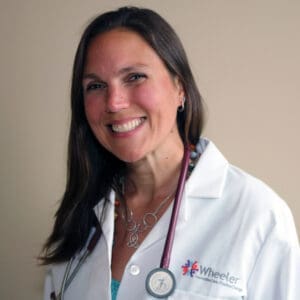The MetroHartford Alliance (MHA) and its initiative the Connecticut Health Council (CHC) place much emphasis on the overall health and wellbeing of those living and working in Connecticut. As the CHC prepares for The Health And Financial Impact of Obesity webinar on September 9, we’re doing a deep dive with some regional organizations to better inform our audience.
MHA Content Manager Nan Price spoke to Wheeler Family Health & Wellness Centers Medical Director Rebecca Eleck Bruce, MD and Nutritionist Jessica Masterson, RDN, CDN, CDCES to learn more about how the company supports healthy living in our state.
NAN PRICE: In what ways does Wheeler address obesity and being healthy at every weight?
 REBECCA ELECK BRUCE: Health and obesity are such complicated issues that have nothing to do with a personal willpower and everything to do with things like social determinants of health, the environment we live in, stress management, and past traumas. We want to ensure that we’re supporting patients by helping them find solutions for long-term health, whether that means weight loss or being healthy at whatever size.
REBECCA ELECK BRUCE: Health and obesity are such complicated issues that have nothing to do with a personal willpower and everything to do with things like social determinants of health, the environment we live in, stress management, and past traumas. We want to ensure that we’re supporting patients by helping them find solutions for long-term health, whether that means weight loss or being healthy at whatever size.
Wheeler has behavioral health consultants who use a technique called motivational interviewing where they ask patients what they see as their biggest challenge and help them come up with their own ideas to improve their situation. From there, we have many resources to support patients.
Our dietician, Jessica, meets with patients and clients to talk about healthy choices they can make, helping them find small tweaks within their budget.
JESSICA MASTERSON: All of our providers refer clients for nutrition counseling when they recognize they’re struggling with health or weight. We feel it’s most important to focus more on healthy eating as opposed just to numbers on the scale because there are different ways to be “healthy.” And sometimes talking about health is uncomfortable for clients if it’s all focused on weight. A better approach is changing the narrative to discuss how we want people to eat healthier to help their health so they feel better mentally and physically.
Obesity increases risks for things like diabetes and heart disease, which has a huge impact on the costs of health insurance. If we taught people to eat healthy and be more active, we’d save money on things like medications for diabetes and cholesterol. It’s important to starting earlier too, getting kids eating healthy so they incorporate those habits their whole entire life.
NAN: Can you tell us a little more about some of the resources available from Wheeler?
REBECCA: We encourage our patients to find healthier habits, like committing to an exercise program and making healthier decisions around food choices. We have a grant in place that includes nutrition counseling and promotes physical activity. And we have resources to help clients get gym memberships, new sneakers, and Fitbits. Before COVID-19, we offered free Zumba, yoga, and meditation classes on location for our patients and clients.
In terms of food, if patients and clients are struggling to pay for their bills or afford healthy foods, we have a Basic Needs Fund we can use to help them with some grocery store gift cards. And, through a partnership with Holcomb Farm, we distribute vegetables one day a week to Wheeler patients.
We’ve also been working on partnerships with local YMCAs and other area non-profits we can refer patients to if they need further assistance.
NAN: How can organizations help their employees stay healthy?


NAN: In terms of health, what is Connecticut doing well–and where is there room for improvement?
REBECCA: I’m a firm believer in the Blue Zones projects, which take a community-wide approach to creating healthier and more productive citizens. I also feel that health and weight management isn’t truly an individual thing, but it’s a factor of the environment. We can talk to individuals tell them how to eat better and how to move more, but we’ll create more impact if we can change the environments around us to make all these things easier and ensure that people have access regardless of their income.
Connecticut’s Rails-to-Trails program has been phenomenal. Building safe places to walk into everyone’s local environment and creating more opportunities to bring farmers markets and support local vegetables and fruit in every neighborhood would go a long way. Another example is how our state has made access to the state parks free, which is great. The more we can build awareness about families getting out and being active together. We’re doing all those things well—and we need to do more.
Learn more about Wheeler Clinic
www.wheelerclinic.org | LinkedIn
Read an interview with Wheeler Clinic President and Chief Executive Officer Sabrina Trocchi
Register to attend The Health And Financial Impact of Obesity, September 9 from 9:00 to 10:00 a.m.
